Iran Has Submitted 'Documents' On Role Of Foreigners In Protests

Iran says it has taken measures to provide countries whose citizens “stirred violence” during the recent protests, with documents proving their role.

Iran says it has taken measures to provide countries whose citizens “stirred violence” during the recent protests, with documents proving their role.
Foreign Ministry Spokesman, Nasser Kanaani said Monday that the ministry has contacted the respective countries and informed them about the role of their nationals in “riots”, without naming the countries he referred to.
“Judiciary action has been taken regarding the interventions that have caused damage in Iran and the performance of those countries whose citizens have committed crimes or have somehow played a role in connection with the riots,” added Kanaani during his weekly briefing.
He claimed that the missions of the Islamic Republic of Iran and ambassadors have informed foreign countries of the cases in the framework of diplomatic meetings.
He said in some cases the missions have also provided the corresponding governments with needed evidence, submitting letters of protest and official notes.
Iranian security forces have arrested a number of foreigners, including US, British and French citizens, for their alleged involvement in anti-government protests.
On October 20, Fars New Agency, which is affiliated with the Revolutionary Guard, said “citizens of 14 countries, including the United States, Russia, Austria, France, the United Kingdom, and Afghanistan, have been arrested in recent riots in Iran.”
Last week, the chairman of the board of Iran's Tourist Guide Association, Mohsen Haji Saeed said the Islamic Republic has arrested many foreign tourists who took photographs from the ongoing protests “out of curiosity.”
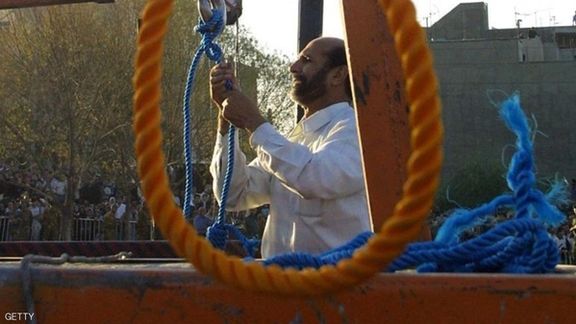
A Revolutionary Court in Iran has issued the first death penalty against a protester and another court sentenced five others from five to 10 years in jail each.
According to the Iranian Judiciary, this is only the starting point of trials for those arrested during the protests in the past two months and further trials will be held later.
The Iranian Judiciary has not named the prisoners but claimed that the young man sentenced to death had allegedly set fire to a government office building.
The verdicts have been issued by a "court of first instance" and may be changed if those convicted refer the case to a court of appeal.
No one knows when and where the trials were held or if the accused had a chance to defend themselves. In most similar cases the government does not allow defendants to choose their own lawyers and there is no due process of law.
Meanwhile, the Iranian Prosecutor General, Mohammad Jafar Montazeri has repeated claims that "the ongoing protests in Iran are being steered by the United States and other Western countries. They have deceived some of the protesters and paid some others to stop the Islamic Republic's progress."
Montazeri claimed that protesters have killed some 40 Revolutionary Guards, Basij militia and other security officers so far.
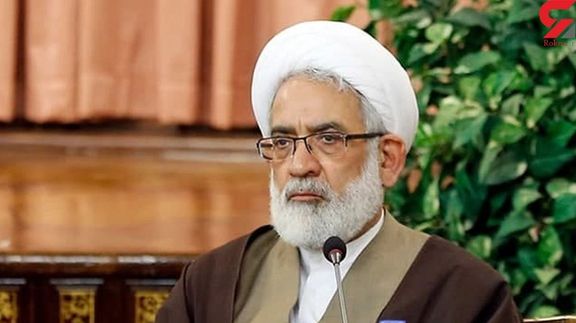
The first verdicts against Iranian protesters have been issued about a week after some 227 Iranian lawmakers called for the execution of detained protesters. However, during the past two days some of them have attempted to deny the report after extremely strong condemnations by other politicians, pundits and social media users.
Some activists on social media have threatened to fight back violently and go beyond turban-tossing as their response to executions of protesters by the hardliner Judiciary and security forces.
Prosecutor Montazeri added that although courts have been ordered to investigate the cases quickly, still trials may take longer than expected as hearing sessions need to be furthered diligently.
In the meantime, Iranian pundits advised both the government and protesters to avoid radicalism. Political activist Mansoor Haghighatpur told Nameh News website that "both left-wing and right-wing radicals in Iran have gone too far, and the Islamic Republic should get rid of both."
He added that the radicals prevented the fruition of negotiations to revive the 2015 nuclear deal, attacked the Saudi and British embassies in Iran and caused many further losses to the Islamic Republic and the people of Iran." He was referring to hardliners loyal to the core of the regime controlled by the 83-year-old ruler Ali Khamenei and the Revolutionary Guard. These elements operate freely when needed as was the case with the attack and destruction of the Saudi embassy in January 2016, when no one was punished.
Haghighatpur added that the officials must ensure the participation of all political groups in decision making if the country is going to be run based on democracy.
He argued that the government should help people to voice their demands and it must use the state television and social media for this purpose. This comes while the government has banned access to social media and the state television has been condemned by many for its unilateral approach to programming. Haghighatpur also said that people should be allowed to gather in front of the Parliament (Majles) to voice their political demands.
“We saw them attacking moderate politicians” such as Hassan Khomeini, Ali Akbar Nateq Nouri and Ali Larijani during their speeches. "If radicals are allowed to be active, they will cause further damage to the regime," Haghighatpur said, without alluding to who controls and directs these forces.

Demonstration continued in Iranian universities Sunday as people are preparing for three days of protest rallies in honor of over 1,500 protesters killed by security forces in November 2019.
Grassroot groups have called for protests across the country for November 15, 16, and 17 while most of the action on Sunday was taking place at numerous campuses with students staging sit-ins and cancelling classes in solidarity with the revolt against the Islamic Republic regime.
Students chanted slogans and sang along songs in protest to the detention and expulsion of their classmates, as well as against the bloody crackdown on the popular protests.
Moreover, a group of more than 70 faculty members and professors of Babol Noshirvani University of Technology in northern Iran, issued a letter on Sunday, demanding an end to entry bans and suspensions of students, as well as ensuring their security in the university and dormitories.
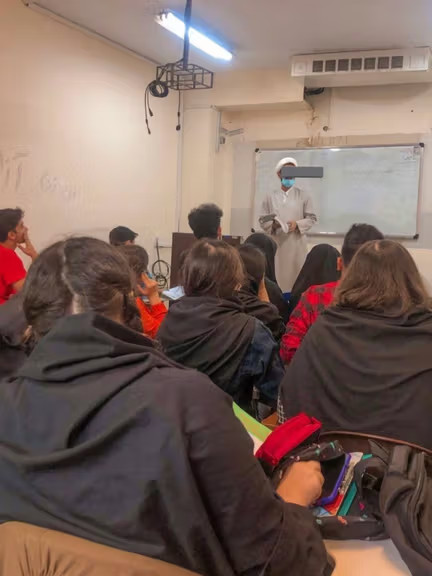
In addition to university students, many schoolchildren held rallies as they leave their schools, chanting slogans against the regime and its rulers.
In a joint call by the Youth of Tabriz, Zanjan, Esfahan, Mashhad, Ahvaz, Gorgan and Babol have urged people to pour into the streets on the anniversary of those killed in November 2019 on Tuesday. “We will start from high schools, universities and markets and continue with neighborhood-centered gatherings to move to main squares of cities,” read part of the statement.
A series of nationwide protests in Iran, sometimes known as Bloody November, took place in 2019. Initially triggered by a 50 to 200-percent increase in fuel prices, the demonstrations quickly turned into calls for the overthrow of the government and Supreme Leader Ali Khamenei. According to a report by a rights group, at least 3,000 protesters were killed by the Islamic Republic security forces from November 15 to 17, and nearly 20,000 arrested. Reuters at the time reported 1,500 deaths.
Since the current uprising began against Iran’s clerical regime almost two months ago, following the death of Mahsa Amini in police custody, numerous calls have been issued by groups, institutions, guilds, and associations for demonstrations, gatherings, and strikes.
Also on Sunday, Iran's judiciary charged more than 750 people in three provinces for participating in "recent riots." More than 2,000 people had already been charged, nearly half of them in the capital Tehran, since the demonstrations began in mid-September. They face accusations including "incitement to murder", "harming security forces", "propaganda against the regime" and "damaging public property", the judiciary's Mizan Online news website reported.
After a threat by hardliner lawmakers earlier in the month asking that protesters be sentenced to death, the Judiciary signaled its intention to do just that on November 8.
So far at least 326 protesters – including 43 minors-- have been killed and tens of thousands arrested, although the government has not issued any figures.
On Saturday, diaspora Iranians in Europe, North America and elsewhere held rallies to condemn the Islamic Republic for brutality against antigovernment protesters.
Coupled with the activism of the Iranian diaspora and the calls with rallies to mark the anniversary of Bloody November, the UN Human Rights Council is set to hold a special session the following week over the Islamic Republic heavy-handed clampdown.
In a phone conversation with UN Secretary General Antonio Guterres Thursday night, Iran’s Foreign Minister Hossein Amir-Abdollahian warned of the “negative consequences” of the UNHRC’s meeting.
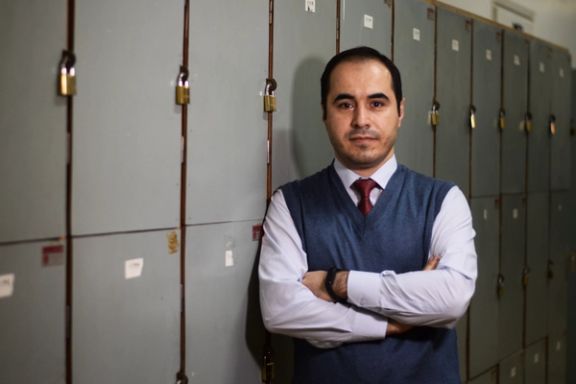
Iranian dissident blogger Hossein Ronaghi’s health has life-threateningly deteriorated because of his hunger strike and other medical conditions at Tehran’s Evin Prison.
In a statement from Evin Prison Saturday, imprisoned filmmakers Jafar Panahi and Mohammad Rasoulof warned about serious deterioration of Ronaghi’s health and said he is in danger of having a stroke any minute after fifty days of hunger strike.
Hossein Ronaghi who has been on hunger strike since his arrest on September 24 amid Mahsa Amini protests has refused liquid nourishment and water since Saturday. Ronaghi who was badly beaten in detention by agents who broke both his legs had said he would refuse all food and liquid nourishment if he was arrested again.
In September after protests began, security agents tried to enter Ronaghi’s apartment while he was being interviewed by Iran International TV online. “I think they are here,” he said before the interview ended but he managed to escape. He was arrested violently along with two of his lawyers when he presented himself to the authorities.
The reason he escaped the first arrest was that once plainclothesmen take someone away, they can kill the person, while the authorities can claim no knowledge of the incident. Ronaghi, therefore, decided to officially present himself to the prosecutor at Evin Prison.
His brother Hassan Ronaghi in a tweet Sunday said his brother’s condition has worsened and he has been taken to the prison clinic. The family say he has been denied proper medical care since his arrest despite several serious medical conditions including partial kidney failure, and broken legs.
Ronaghi who was first arrested during the 2009 post-election unrest has been in and out of prison several times. He lost one kidney because of physical abuse and torture, lack of medical treatment, and the effect of several hunger strikes during his previous imprisonments. His remaining kidney is badly damaged too.
Ronaghi previously went on hunger strike three times. -- in June, August, and October 2010 -- in protest to maltreatment and pressures to consent to televised false ‘confessions’ against himself and others. He only ended his hunger strike when his mother also went on a hunger strike that lasted nearly two weeks.
Ronaghi’s father was hospitalized on November 3 when he had a stroke outside Evin while trying to talk to prison authorities about his son’s situation.
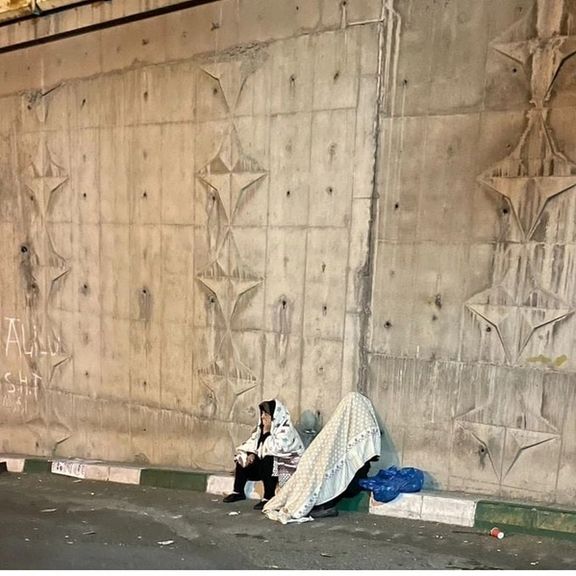
Hassan Ronaghi said Saturday that his brother had seizures several times, but judicial authorities refuse to free him despite medical authorities’ confirmation that he is not fit to serve a prison sentence.
“Prison authorities and the Evin Prosecutor want to kill Hossein,” he wrote, adding that the Supreme Leader’s Office, intelligence ministry and judicial authorities should be held to account if something happens to his brother.
Panahi and Rasoulof warned about Ronaghi’s determination to start refusing liquids and said he could lose his life like prisoner of conscience Behnam Mahjoubi and jailed poet Baktash Abtin both of whom were denied timely medical care and died at Evin Prison in the past ten months.
In a tweet Saturday, Fakhri Mohtashami, the wife of prominent political prisoner Mostafa Tajzadeh who is also serving a sentence at Evin Prison, said her husband had seriously warned about Ronaghi’s condition in a phone call from the prison. Tajzadeh told his wife that Ronaghi is extremely weak, and something had to be done before it got too late.
“Hossein Ronaghi’s health is failing...He has decided to refuse water, sugar and salt. This means danger of death,” former political prisoner Kianoosh Sanjari tweeted Saturday while remembering the loss of his comrade Akbar Mohammadi who died of hunger strike and lack of medical care in 2006 while both were held at Evin Prison.
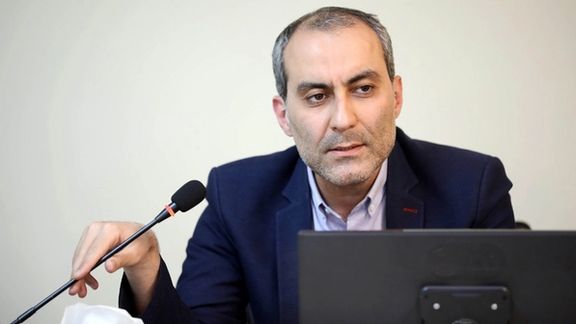
Almost half of the Internet service providers in Iran have seen a 50% drop in sales due to disruptions, censorship, and Internet shutdowns by the government during protests.
The computer trade union of Tehran -- or Tehran ICT Guild Organization -- announced Saturday that based on a survey conducted at 104 member companies, almost half of the ISP firms have faced a 50% drop.
The union's secretary Alireza Keshavarz Jamshidian went on to say that about half of the Internet providers lost over 500 million rials (around $1,400) a day, as sales dropped. However, he added, one-fifth of the companies say they suffered between $2,800 and $14,000 loss a day.
“We may not have complete internet outages these days, but restrictions are created through censorship. For example, WhatsApp and Instagram messengers are banned, inflicting damages on people who had a home business on these platforms,” stressed Keshavarz.
Since the beginning of the protests triggered by the death of Mahsa Amini in the custody of the morality police, severe restrictions have been placed on the Internet for more than 50 days.
International internet monitoring groups, including NetBlocks, have repeatedly reported that the flow of data in different cities of the country has reached “a quarter” of its normal.
Regime officials restricted access to the internet to limit the free circulation of information and the posting of videos on social media platforms.
Earlier, the E-Commerce Association in Tehran announced the internet shutdown costs Iran $1.5 million per hour.
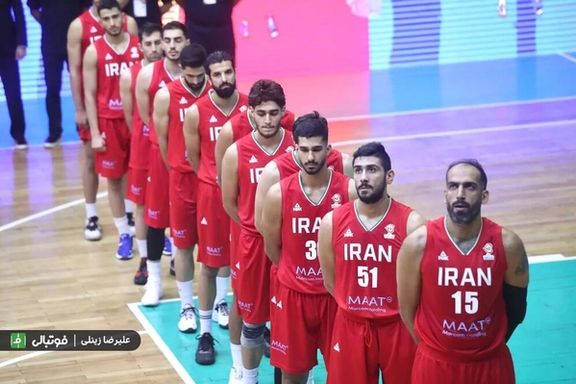
While Iran’s football team is about to embark on its World Cup journey in Qatar, the Islamic Republic is worried that the event serves as an opportunity for antigovernment protests.
Since the current wave of demonstrations began in mid-September, following the death in custody of a young woman, more and more athletes have expressed solidarity with the people either in bold public statements or through different forms of disobedience, such as not singing the Islamic Republic’s national anthem during matches.
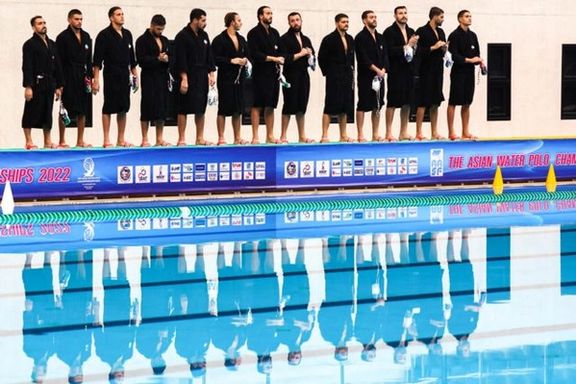
In less than a month, the pace of the athletes showing support for the protests has accelerated as the Iranian football, beach football, waterpolo, basketball, and sitting volleyball teams refused to sing along with the anthem, which is customary in almost all international competitions. Now with the biggest sporting event on the horizon, the regime is resorting to whatever it can to stifle the voices of dissent.
Authorities have made serious threats against athletes and other celebrities to stop them from public displays of solidarity with protesters but to no avail.
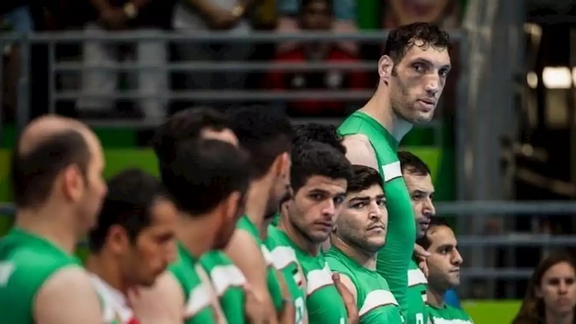
Threatening to remove players from the national squad, Ahmad Rastineh, the spokesman of the parliament’s cultural committee, said on Sunday that "if a player does not have a proper understanding” of the current affairs, it is not necessary to keep them in the national outfit.
Earlier in the month, the beach football federation of the Islamic Republic threatened the players of the national squad for their acts of solidarity with the antigovernment protests.
The national team players did not cheer or celebrate after winning the cup following their final victory against Brazil and also refused to sing the national anthem of the Islamic Republic at the beginning of their semifinal match against the UAE.
During the final, Iranian striker Saeed Piramoun expressed his solidarity with Iranian protesters by miming the hair cutting gesture after scoring a goal. The gesture has become an international symbol of solidarity with Iranian women and the protest movement with many international athletes and celebrities posting images of themselves re-enacting the move. Islamic Republic officials also issued a threatening message to the United Arab Emirates that hosted the Beach Soccer Intercontinental Cup.
A new trending act of solidarity that is catching on in the past several days, is the reenactment of a photo of one the protesters killed by security forces in the Baluch-majority province of Sistan and Baluchestan.
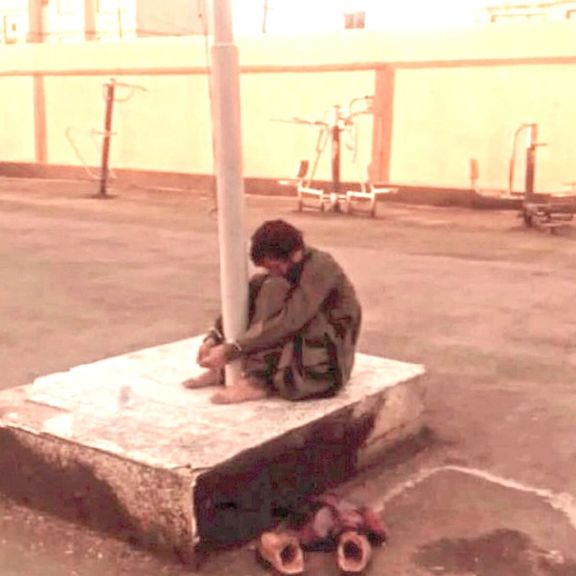
The iconic photo, which is from an earlier event, shows Khodayar Lojei handcuffed to a post while a glass of water is placed near him but with a distance he cannot reach. Several football and futsal players sat in the same position instead of cheering after scoring a goal while another player put a symbolic glass of water near them.
Also on Sunday, Andrea Stramaccioni, the former Italian coach of the popular football club Esteqlal, said in an Instagram story that he was approached by many Iranian state TV sport programs to appear in their shows as a guest during the World Cup, noting that he rejected the offers because the state broadcaster is suppressing the voice of people.
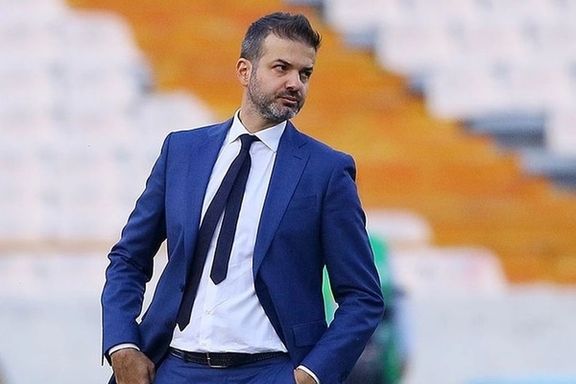
Addressing the Iranians, he said, “My heart is with you and refusing participation in programs and television you don’t approve of is the least I can do to support your brave movement. Do not lose your hope because the Iranian people we saw deserve a lot more than what they already have.”
During a press conference after the Iranian basketball team’s match with the Chinese squad, several journalists walked out as a show of solidarity with their peers arrested for reporting on Islamic Republic’s deadly violence against protesters.
"Our colleagues have been arrested for some time and are now in prison. We cannot [continue our work] until they are released... We have decided to leave this place. We are not spies or criminals. We are journalists. We are only journalists; sport journalists," said one of the reporters before leaving the room.